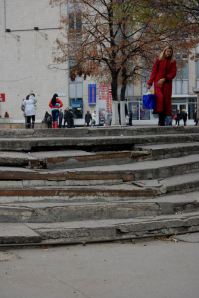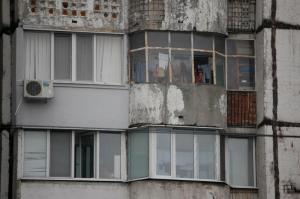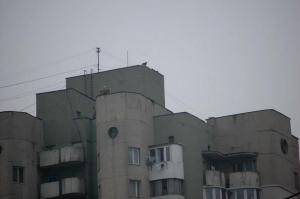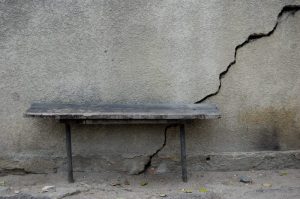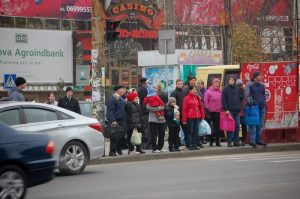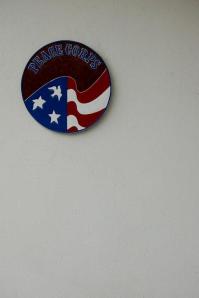This morning during the course of a phone conversation with my daughter, I found myself voicing the surprising observation that maybe? Perhaps? Could it be that I’m depressed? This proposition actually shocked me because for most of my life my mental landscape has been infused with, if not the garish balloons of happiness, then at least those pale-pink bubbles of contentment that manage to percolate and regenerate, despite oscillations of fortune and fate. But over the past few years, ostensibly since my return from Peace Corps, those pretty pink bubbles have flattened; there are not so many of them and they tend to pop before they get off the ground. While I’m not drowning in the somber blue hues of sadness, per se, I do notice that I lack that characteristic acceptance of the world as a good place to be. I feel sort of gray and faded and slightly bruised, as if I’ve been through the wash too many times and then tumbled in a dryer for hours. The first impulse that grazes my mind when I awake in the morning is to shut my eyes and go back to sleep; the thought of a new day arouses no anticipation or delight.
My daughter agreed with my self-diagnosis rather too quickly for my comfort, I’ll admit. She recalled that I’ve always been a capable, efficient problem-solver, ready to plan, develop a strategy, excited to take on any challenge that presented itself. I concurred that I feel mysteriously helpless these days, as if I am caught in a perpetual fog without any goal posts to define success. She and my husband have attributed this ennui to me living with three people who are in a different life stage but nonetheless corral me into an world view replete with the prosaic irritations and inconveniences of aging. I halfheartedly agreed, thinking that this assessment might suggest a nuance of my psychological affliction but does not apprehend its essence.
But then we hung up and I clicked on to my news feed like I do randomly at least ten times a day and the stark negativity of the scrolling headlines assailed me, capturing in an instant the chronicity of what’s ailing me. All the relentlessly horrific news, hour after hour, day after day, stretching beyond a few unfortunate months into a bleak accumulation of years: climate change, rising sea levels, monster hurricanes, water table depletion, cataclysmic drought, species extinction, opioid addiction, soaring home prices, rampant gun violence, human trafficking and exploitation, Hong Kong, China, the Middle East, Venezuela, Brexit, the resurgence of nationalism, increasing suicide rates, growing economic disparity…the list is endless and plays in a recurring loop not just on my news feed but in my subconscious mind. I once subscribed to the tired adage that knowledge is power, but I’m beginning to think that nowadays most knowledge is just overwhelming and debilitating.
And, of course, there is no one bad guy in all this (though I could certainly identify a couple.) There is not a single cause or genesis for the burgeoning cancers plaguing our planet. Instead, it seems like the primal forces and genetic attributes that shaped the trajectory of our evolution are being dramatized across the global stage and no one has any viable means for snatching them back behind the curtain. Our curiosity and acquisitiveness, tribalism and egoism, technologies and innovations are accelerating and amplifying the fears, vulnerabilities and superstitions that have always lurked in the basements of our psyches. Now that a political protester in Hong Kong can send her activist buddy in California minute by minute updates of what’s transpiring at the airport, we have effectively outmaneuvered all the filters – such as time, distance, and objectivity – that once tempered the channels and flow of information. Seemingly every time we open our social media feeds, tune in to a podcast, attend a public gathering, or flip on the news we are assaulted by strident opinions, catastrophic events, and scary science. One has to be diligent in assessing the information presented to uncover all the forces at work behind the scenes in order to comprehend the interplay of both historic elements and current events. It is an exhausting endeavor to stay responsibly aware and informed, an effort that most folks have no time – or perhaps its just a dearth of available energy – for these days.
One recent podcast on the economic implications and complexities involved in culling elephant herds in Africa sent me on a three-hour long dive into National Geographic videos, World Economic Forum reports, and scientific white papers. Conclusion: there is nothing I can do to solve the overpopulation issues of elephants versus humans in Africa. And is the fact that I now understand them just a little bit better going to make any difference in how I operate in the world? Probably not. It just makes me more depressed. Then there’s my informed take on Boris Johnson: I had read numerous articles and listened to several podcasts that led me to conclude that his suspension of Parliament was a Machiavellian maneuver designed to derail his political opponents. But then a subsequent conversation with my husband (whom I generally trust to have done more even more research than me) cast a pall over my conviction. Could Johnson perhaps have a superlative appreciation for the least ugly option to force the Brexit debacle toward some sort of resolution? I don’t know; it’s just too complicated for my overburdened brain to process.
I know people who just opt out, choose to not look. They’re busy fiddling, or working, or raising children, making art or honing a skill, binge-watching Netflix, or traveling in Indonesia. One of the more magnificent aspects of modernity is that it offers us a smorgasbord of entertainment choices, lifestyle options, educational opportunities, and professional pursuits. It does not provide any attention guidelines or morality gauges to accompany them, however. So, it can become a relief to put the blinders on, voluntarily choose ignorance, fill one’s hours and days with responsibilities and errands and distractions and amusement. Who can blame any of us for intentionally avoiding the congestion and smog of intercontinental highways in favor of the narrower, quieter private footpaths?
To ground these esoteric speculations in my daily life and demonstrate their impact, let me describe what should have been a stress-free family gathering last Monday that I managed to twist into a fraught-filled opportunity for disaster:
My dad and I stopped by niece’s apartment complex on Labor Day to enjoy a meal and a swim. My daughter and her fiancée were there, along with my 3-year-old twin grandsons, my 9-year-old niece, and my brother. My niece’s husband was BBQing carnitas, the adults were enjoying some chips and cocktails, and there was a relaxed vibe of summer simmering down in the air. Both boys had arm flotation devices on as they played by the edge of the pool, hopping on and off an inflated raft under my daughter’s watchful eye. Yet I became unaccountably obsessed with a fear of them falling in – which would not be disastrous in any case because, as I mentioned, they were strapped into flotation devices. I sat distracted, unable to attend to conversation, eyes glued to the boys, hands clutching the arms of my chair (ready to launch into a dive should one of them fall in, my daughter’s fiancée jokingly observed). I became such a general buzzkill for everyone that Dad and I wound up leaving early.
Now, reflecting on that experience, along with so many others where I have overreacted to a perception of the boys’ relative safety and well-being, I begin to trace the dim outlines of my current emotional geography: I am constantly, chronically, helplessly adrift in an amorphous sea of worry and anxiety. It has been during the three years since their birth that this worry and anxiety has taken a more tangible form and found an anchor in them. Babies are so incredibly dependent and fragile; even as they grow into toddlers and little kids, increasing their ability to navigate their environment, we appreciate how vulnerable they are to mishaps and accidents. Our natural inclination as adults (especially mothers) is to anticipate and avert those mishaps, seeking to protect and preserve their innocence and joy. And on the macro-scale I’ve checked all the preventative boxes in my due diligence to ensure them a viable future: I dutifully vote in each election; fire off letters to my representatives; recycle, repurpose, and reuse; conserve water and energy; drive an eight-year-old, four-cylinder compact, yada, yada, yada. It feels like fragile fingers stuck in a trembling dike when countless leaks are springing open every minute. I seem to know in my bones that it’s just a matter of time before the whole thing comes crashing down and most of us are swept away. Which happens to include two of the people most important to my world: my grandsons. So, instead, fingers in the dike, I attempt to control the small, mundane circumstances of their existence: supervising their proximity to the street during playtime; checking on their breathing throughout the night whenever I sleep over; Googling food additives and sunstroke symptoms; obsessively monitoring their vaccinations and oral hygiene; assessing the intentions of passersby – all admittedly misdirected and ultimately futile attempts to hold back the tsunami of a global, increasingly insane reality. The truth is the odds are stacked against them and their viable future. It all screams disaster from here.
For the life of me, I can’t understand why those who do have some influence or power to alter the course of this tsunami don’t look at their children and grandchildren in the same way. Rather, it’s the children and grandchildren themselves compelled to call out the powers-that-be, broadcasting forcefully and relentlessly the message that “what’s at stake right now is the existence of [our] generation.”
This is the true nature of the knowledge that debilitates me, begs me to close my eyes and sleep, turn my head and stream. My joyful, innocent grandsons have much to fear over the horizon and not a lot of promise to fill their sails. For every nugget of optimism or resiliency I run across, there are metric tons of misery, despair, and anguish outweighing it. When I was a child during the 1960’s and early ‘70’s, the world was filled with fantastic possibilities; we were voyaging into space, plumbing the ocean depths, fighting social injustice, redefining civil rights, agitating for peace, celebrating diversity, and generally expanding our horizons. These days, it feels as if we’re cultivating the habit of shrinkage, erecting fences and borders, exploding bridges and connections, collapsing in upon ourselves in fear.
Every day, every moment, I sit on the sidelines, obsessed with the headlines, no agency to alter the course. I must watch from the bleachers as the lambs are led to slaughter. The world is spinning on a tilting axis of madness.
Maybe it is the blue hue of sadness after all.
*photo courtesy of Thierry Fillieul from pexels.com
This morning during the course of a phone conversation with my daughter, I found myself voicing the surprising observation that maybe? Perhaps? Could it be that I’m depressed? This proposition actually shocks me because for most of my life my mental landscape has been infused with, if not the garish balloons of happiness, then at least those pale-pink bubbles of contentment that manage to percolate and regenerate, despite oscillations of fortune and fate. But over the few years, ostensibly since my return from Peace Corps, there has been a noticeable flattening of these bubble; there are not so many of them and they tend to pop before they get off the ground. While I’m not drowning in the somber blue hues of sadness, per se, I do notice that I lack that characteristic acceptance of the world as a good place to be. I feel sort of gray and faded and slightly bruised, as if I’ve been through the wash too many times and then tumbled in a dryer for hours. The first impulse that grazes my mind when I awake in the morning is to shut my eyes and go back to sleep; the thought of a new day arouses no anticipation or delight.
My daughter agreed with my self-diagnosis rather too quickly for my comfort, I’ll admit. She recalled that I’ve always been a capable, efficient problem-solver, ready to plan, develop a strategy, excited to take on any challenge that presented itself. I concurred that I feel mysteriously helpless these days, as if I am caught in a perpetual fog without any goal posts to define success. She and my husband have attributed this ennui to me living with three people who are in a different life stage but nonetheless are corralling me into an world view replete with the prosaic irritations and inconveniences of aging. I half-heartedly agreed, thinking that this assessment might suggest a nuance of my psychological affliction but does not apprehend its essence.
But then we hung up and I clicked on to my newsfeed like I do randomly at least ten times a day and the stark negativity of the scrolling headlines assailed me, capturing in an instant the chronicity of what’s ailing me. All the relentlessly horrific news, hour after hour, day after day, stretching beyond a few unfortunate months into a bleak accumulation of years: climate change, rising sea levels, monster hurricanes, water table depletion, cataclysmic drought, species extinction, opioid addiction, soaring home prices, rampant gun violence, human trafficking and exploitation, Hong Kong, China, the Middle East, Venezuela, Brexit, the resurgence of nationalism, increasing suicide rates, growing economic disparity…the list is endless and plays in a recurring loop not just on my news feed but in my subconscious mind. I once subscribed to the tired adage that knowledge is power, but I’m beginning to think that nowadays most knowledge is just overwhelming and debilitating.
And, of course, there is no one bad guy in all this (though I could certainly identify a couple.) There is not a single cause or genesis for the burgeoning cancers plaguing our planet. Instead, it seems like the primal forces and genetic attributes that shaped the trajectory of our evolution are being broadcast and dramatized across the global stage and no one has any viable means for snatching them back behind the curtain. Our curiosity and acquisitiveness, tribalism and egoism, technologies and innovations are accelerating and amplifying the fears, vulnerabilities and superstitions that have always lurked in the basements of our psyches. Now that a political protestor in Hong Kong can send her activist buddy in California minute by minute updates of what’s transpiring at the airport, we have effectively outmaneuvered all the filters – such as time, distance, and objectivity – that once tempered the channels and flow of information. Seemingly every time we open our social media feeds, tune in to a podcast, or flip on the news we are assaulted by strident opinions, catastrophic events, and scary science. One has to be diligent in assessing the information presented to uncover all the forces at work behind the scenes in order to comprehend the interplay of both historic elements and current events. It is an exhausting endeavor to stay responsibly aware and informed, an effort that most folks have no time – or perhaps its just a dearth of available energy – for these days.
One recent podcast on the economic implications and complexities involved in culling elephant herds in Africa sent me on a three-hour long dive into National Geographic videos, World Economic Forum reports, and scientific white papers. Conclusion: there is nothing I can do to solve the overpopulation issues of elephants versus humans in Africa. And is the fact that I now understand them just a little bit better going to make any difference in how I operate in the world? Probably not. It just makes me more depressed. Then there’s my informed take on Boris Johnson: I had read numerous articles and listened to several podcasts that led me to conclude that his suspension of Parliament was a Machiavellian maneuver designed to derail his political opponents. But then a subsequent conversation with my husband (whom I generally trust to have done more even more research than me) cast a pall over my conviction. Could Johnson perhaps have a superlative appreciation for the least ugly option to force the Brexit debacle toward some sort of resolution? I don’t know; it’s just too complicated for my overburdened brain to process.
I know people who just opt out, choose to not look. They’re busy fiddling, or working, or raising children, making art or honing a skill, binge-watching Netflix, or traveling in Indonesia. One of the more magnificent aspects of modernity is that it offers us a smorgasbord of entertainment choices, lifestyle options, educational opportunities, and professional pursuits. It does not provide any attention guidelines or morality gauges to accompany them, however. So, it can become a relief to put the blinders on, voluntarily choose ignorance, fill one’s hours and days with responsibilities and errands and distractions and amusement. Who can blame any of us for intentionally avoiding the congestion and smog of intercontinental highways in favor of the narrower, quieter footpaths?
To ground these esoteric speculations in my daily life and demonstrate their impact, let me describe what should have been a stress-free family gathering last Monday that I managed to twist into a fraught-filled opportunity for disaster:
My dad and I stopped by niece’s apartment complex on Labor Day to enjoy a meal and a swim. My daughter and her fiancée were there, along with my 3-year-old twin grandsons, my 9-year-old niece, and my brother. My niece’s husband was BBQing carnitas, the adults were enjoying some chips and cocktails, and there was a relaxed vibe of summer simmering down in the air. Both boys had arm flotation devices on as they played by the edge of the pool, hopping on and off an inflated raft under my daughter’s watchful eye. Yet I became unaccountably obsessed with a fear of them falling in – which would not be disastrous in any case because, as I mentioned, they were strapped into flotation devices. I sat distracted, unable to attend to conversation, eyes glued to the boys, hands clutching the arms of my chair (ready to launch into a dive should one of them fall in, my daughter’s fiancée jokingly observed). I became such a general buzzkill for everyone that Dad and I wound up leaving early.
Now, reflecting on that experience, along with so many others where I have overreacted to a perception of the boys’ relative safety and well-being, I begin to trace the dim outlines of my current emotional geography: I am constantly, chronically, helplessly adrift in an amorphous sea of worry and anxiety. It has been during the three years since their birth that this worry and anxiety has taken a more tangible form and found an anchor in them. Babies are so incredibly dependent and fragile; even as they grow into toddlers and little kids, increasing their ability to navigate their environment, we appreciate how vulnerable they are to mishaps and accidents. Our natural inclination as adults (especially mothers) is to anticipate and avert those mishaps, seeking to protect and preserve their innocence and joy. And on the macro-scale I’ve checked all the preventative boxes in my due diligence to ensure their future: I dutifully vote in each election; fire off letters to my representatives; recycle, repurpose, reuse; conserve water and energy; drive an eight-year-old, four-cylinder compact, yada, yada, yada. It feels like fragile fingers stuck in a trembling dike when countless leaks are springing open every minute. I seem to know in my bones that it’s just a matter of time before the whole thing comes crashing down and most of us are swept away. Which happens to include two of the people most important to my world: my grandsons. So, instead, fingers in the dike I attempt to control the small, mundane circumstances of their existence: supervising their proximity to the street during playtime; checking on their breathing throughout the night whenever I sleep over; Googling food additives and sunstroke symptoms; obsessively monitoring their vaccinations and oral hygiene; assessing the intentions of passersby – all admittedly misdirected and ultimately futile attempts to hold back the tsunami of a global, increasingly insane reality.
For the life of me, I can’t understand why those who do have influence and power to alter the course of this tsunami don’t look at their children and grandchildren in the same way. Rather, it’s the children and grandchildren themselves compelled to call out the powers-that-be, broadcasting forcefully and relentlessly the message that “what’s at stake right now is the existence of [our] generation.”
This is the nature of the knowledge that debilitates me, begs me to close my eyes and sleep, turn my head and stream. My joyful, innocent grandsons have much to fear over the horizon and not a lot of promise to fill their sails. For every nugget of optimism or resiliency I run across, there are metric tons of misery, despair, and anguish outweighing it. When I was a child during the 1960’s and early ‘70’s, the world was filled with fantastic possibilities; we were voyaging into space, plumbing the ocean depths, fighting social injustice, redefining civil rights, agitating for peace, celebrating diversity, and generally expanding our horizons. These days, it feels as if we’re in the habit of shrinking, erecting fences and borders, collapsing in upon ourselves in fear.
I am left with no agency to alter the course. I must watch from the bleachers as the lambs are led to slaughter. The world is spinning on a tilting axis of madness.
Maybe it is the blue hue of sadness after all.

 :I boarded a bus yesterday evening to go say goodbye to a couple of friends, a delightful couple with whom I made a memorable trip to Poland (you will always remember the people who walked beside you through Auschwitz.) I was pondering our respective next moves, marveling at the circumstances that brought us into each other’s orbit – them career State Department employees who routinely relocate to a different country every 2-3 years, me having made an impulsive leap out of 20+ years of suburban stasis – when I unwittingly sat down across from this guy pictured above. At first, he was reclining with his head back, eyes shut, legs stuck out straight, for all the world as if his seat was a poolside lounger. I assumed he was a commuter catching a quick nap on the way home. Caught in my reverie, I was barely taking in the cues: wet, mud stained trousers, oil-slicked hair, crispy, sunburned skin. I’ve been living here long enough that my surroundings have receded into a backdrop and no longer command the stage.
:I boarded a bus yesterday evening to go say goodbye to a couple of friends, a delightful couple with whom I made a memorable trip to Poland (you will always remember the people who walked beside you through Auschwitz.) I was pondering our respective next moves, marveling at the circumstances that brought us into each other’s orbit – them career State Department employees who routinely relocate to a different country every 2-3 years, me having made an impulsive leap out of 20+ years of suburban stasis – when I unwittingly sat down across from this guy pictured above. At first, he was reclining with his head back, eyes shut, legs stuck out straight, for all the world as if his seat was a poolside lounger. I assumed he was a commuter catching a quick nap on the way home. Caught in my reverie, I was barely taking in the cues: wet, mud stained trousers, oil-slicked hair, crispy, sunburned skin. I’ve been living here long enough that my surroundings have receded into a backdrop and no longer command the stage.